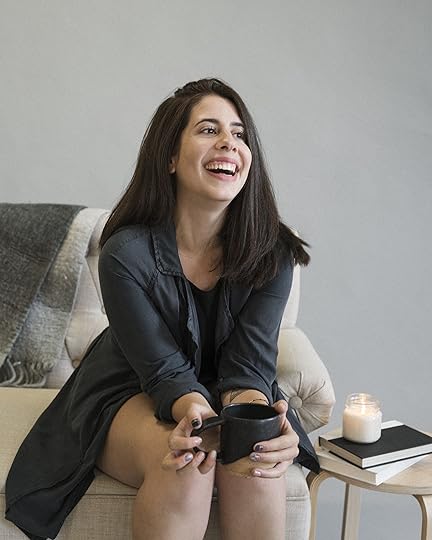Kern Carter's Blog, page 156
February 27, 2020
Lessons Learned from a Life of Writing
February 26, 2020
Author Surrogacy, Psychotherapy, and Great Writing
I am My Writing, My Writing Is Me
February 25, 2020
My Art Helped Me Liberate My True Identity
Allowing my creativity to flow freely propels a journey of self-discovery and self-assertion.
February 21, 2020
New Trend Alert — Podcasters are getting book deals
I previously wrote a newsletter that spoke about authors becoming podcasters to expand their brand. Now let’s talk about the reverse.
The publishing industry, similar to the movie industry, seems to be always searching for the sure thing. So it’s no coincidence that podcasters are now getting book deals.
The industry sees that some of these podcasters have created huge followings by essentially having topical conversations. Turning those conversations into book form isn’t that much of a stretch, especially if the podcast is themed.
Keep your eyes and ears open for this shift. I suspect we’ll be hearing about a lot of these kinds of deals in the months and years to come.
CRY
PREVIOUS LETTERSLook out for these authors from IndiaThe Atlantic is back to publishing short fictionMore writers need to use Artery
New Trend Alert — Podcasters are getting book deals was originally published in C.R.Y on Medium, where people are continuing the conversation by highlighting and responding to this story.
February 19, 2020
Call for submissions — How is your identity connected to your art?
For this month's submissions, I’m curious about how connected you are to your work. Do you write about things you believe in? Is your writing meant to be pleasurable and so you disconnect it from real life? How much of yourself do you include in your writing? And if you are intensely connected to your work, how do you decompress?
The rules:
If you’re already a writer for CRY, simply go ahead and submit.If you would like to submit but you’re not a writer on CRY, reply to this message and I’ll add you.Deadline for submissions is one week from today (February 26).If you’ve never written for CRY before, I suggest you read our submission guidelines.
Thanks in advance to all who submit. We’re excited to read and share your stories.
CRY
PREVIOUS LETTERSA link to popular writing contests for the yearShould short stories get more attention?Harper Collins launches new imprint for young readers
Call for submissions — How is your identity connected to your art? was originally published in C.R.Y on Medium, where people are continuing the conversation by highlighting and responding to this story.
February 18, 2020
Victoria Bevilacqua from PAPER & COIN Magazine— Opinion? Please!
A discussion about the difficulty about creative expression in the era of social media.
February 15, 2020
A link to popular writing contests for the year
Hello fellow writers, if you’re into writing contests, Good Housekeeping recently released a list of popular writing competitions. It includes fiction, short story, poetry and more. If you have a story and want to give it a platform, writing contest are a good outlet.
Check out the full list on Good Housekeeping.
CRY
PREVIOUS LETTERSA new startup is splitting profits with independent bookstoresHarper Collins launches new imprint for young readersThe Atlantic is back to publishing short fiction
A link to popular writing contests for the year was originally published in C.R.Y on Medium, where people are continuing the conversation by highlighting and responding to this story.
February 13, 2020
Vanessa K. De Luca from ZORA — Opinion? Please!
 Magazine-industry veteran, Vanessa K. De Luca (photo by Michael Rowe)
Magazine-industry veteran, Vanessa K. De Luca (photo by Michael Rowe)In this new world where tweets can change the landscape of entire nations, CRY is exploring the role of “opinion” and “perspective” as it relates to creative content and free expression. We interviewed editors from six different publications to discuss their roles in navigating the current creative climate and to get their thoughts on how they balance empowering and editing their creators.
In a world of so many women’s lifestyle platforms, very few accurately depict the multi-dimensional voice and perspectives of women of colour. These pages are often filled with the latest celebrity gossip or stories that lack the range of interests and issues that women of colour face today. This is why ZORA stands out. It’s tagline, Unapologetic. Ours. is equal parts affirmation and declaration that we will be seen and heard.
Just like ZORA’s bold proclamation, Vanessa K. De Luca has been unabashedly amplifying the voices of women of colour for years. From Life and Glamour to being at the helm of Essence magazine, ZORA’s Editor-in-Chief has led the editorial vision for some of your favourite magazines for more than two decades.
Bringing her print magazine expertise over to digital, Vanessa pitched the idea for ZORA to the VP of Editorial at Medium. Rallying behind the marginalized and misrepresented, Vanessa knew that now was the time to create a platform that told a different story than the rest.
One of the things really I had never seen before is a publication that was dedicated specifically to women of colour (all women of colour). Not just black women but women across the spectrum.
Personally, it was a pleasure to speak with the woman whose career I have been following for years. Her vision has created space for words that have mirrored my thoughts, feelings and experiences as a black woman. Here she shares her thoughts on cancel culture, why ZORA is able to produce the content they believe in without fear of upsetting advertisers and how they’ve managed to build a deep trust with their readership.
Prepare to be inspired.
As someone whose job it is to edit and curate content, how do you establish what is acceptable as far as free expression?
I think we are very lucky in that we have the benefit that Medium does not accept advertising. So in the past when I worked at other publications, there has always been this challenge where you may want to take on a controversial subject or highlight a particular product, and you may have someone from the business side come to you and say, “we’re not really comfortable with that because we think that our advertiser is going to have an issue with it.” So, it really does have a chilling effect on your ability to produce the content that you want to produce in the most authentic way possible.
With us having a platform where we don’t have to take [advertising] into consideration, it really frees us up to have people contribute content that’s insightful and that is very opinionated and definitely has a point of view.
It actually shows that we are not all monolithic in our thinking. I think that’s a very important aspect of ZORA. I think too often people will lump women of colour into one big bucket and not really think about the layered, nuanced or textured differences that can come up. So this offers us a way to do that. So we encourage people to speak freely and be truthful about their lived experience.
Within this climate, how would you describe your role as Editor-in-Chief?
I would say that for me it’s “head curator.” I’m helping to provide a platform for other women of colour to have their voices heard. Especially those who are underrepresented and marginalized in the mainstream media. It’s leveraging the power of a platform like Medium to not only call attention to these voices but to also amplify them, and to do that kind of unabashedly.
Going back to that previous point about the perception of women of colour being a monolith, how does ZORA ensure that different thoughts and perspectives are given a voice?
We’re very open about our outreach. We started out from the very beginning representing lots of different groups and different points of view. Quite honestly, a lot of people saw that and recognized that there was a space that was held for this kind of content. So they began reaching out to us like, “I have this great story” or “I’ve been wanting to tell this story for years but I didn’t know where to place it”. So we just started organically developing this relationship with lots of women of colour, from all different walks of life. And they started telling their friends and word-of-mouth just spread. I think that is really powerful because that means that we hit on something that people didn’t even know that they needed.
Let’s talk about cancel culture. The problem with cancel culture can be that “cancelling” someone cuts off the ability to have a conversation and therefore an opportunity to educate/learn. How do you think we can balance holding people accountable for their actions/words while also holding space for people to cross the line but perhaps find their way back?
We have to give each other permission to have healthy dialogue. I don’t think cancel culture is about having a healthy dialogue. It’s about shaming people into feeling some kind of way about something.
And that’s just not healthy for the discourse. It’s not healthy for our ability to build relationships on mutual respect of one another’s opinions.
There are times when we run a story and then on Twitter someone starts poking at it or trying to entice us to get into the argument, but we don’t have a dog in that fight. They don’t have to agree with what we are saying but we have every right to say it. So you are kind of setting the tone for what you will and will not allow people to interact with you. I think especially as an editor, you have to really let people know what you stand for. Once you make that clear, you start to see those kinds of attacks go away.
 ZORA article, “When Black Women Go From Office Pet to Office Threat” (Illustration: Ojima Abalaka)
ZORA article, “When Black Women Go From Office Pet to Office Threat” (Illustration: Ojima Abalaka)So, it’s basically like setting a boundary of what you will and will not tolerate for your publication?
That’s right. Absolutely. Boundary setting is critical. While we will say that we are open to lots of different opinions and we will hear someone out, you do have to set some parameters on how far that can go.
With the “boycotting of opinions” and slogans of “fake news” it can create a lack of trust within our society and especially with the media. At the helm of your publication, how do you ensure that you maintain your readers’ trust?
I think that we are just very clear, honest and upfront with our audience. We’ve established that we aren’t going to deliver them content that’s condescending or makes them feel like we take them for granted. So, it’s us understanding the audience first and foremost.
Then it’s also giving ourselves that permission to show our true selves in terms of our own personal integrity. For example, every editor that works for ZORA was hand-selected. Not just because they are great editors but because of the reputation that they hold and the respect that people have for them in the community. I think that also gives people a feeling that they can really trust what we are delivering because they know the integrity that stands behind it. The authenticity of the people that are producing it.
What is the role of a writer today in a professional setting? Meaning, sites like Twitter and Medium make everyone a “writer”. What sets your publication apart?
I do think that we have a journalistic rigour that we apply to our stories. Even if it’s a personal essay, we’re still asking the right questions of our writers. Saying, “have you explored this fully?” or “Can you add some more information that can be illuminating?” Even if it’s a personal essay, you can add some research that adds just another extra layer to the readers in helping them to understand the point you are trying to make.
That also goes back into that trust factor we were just talking about with the audience. When they know that you are really challenging your writers to be as rigorous as they possibly can, they see that and can feel that it was well written or well reported. It does help build the assurance that this is not “fake news” but that there was some care and investment that was put into what is being created.
CRY

Vanessa K. De Luca from ZORA — Opinion? Please! was originally published in C.R.Y on Medium, where people are continuing the conversation by highlighting and responding to this story.
February 12, 2020
Should short stories get more attention?
They say people don’t read anymore, but I actually think people probably read more than ever. The mediums have changed and attention spans are in line with our social culture, but there are ways to capture readers’ imaginations with a thoughtful, well put together story.
Which is why it’s a bit odd short stories aren’t more popular. Reading one would cover the time it takes to watch an episode of a Netflix series or maybe a full-length documentary. That seems more in line with how much time people are willing to commit to reading books. I know short story collections get a lot of love, but not a short story on its own.
What do you think? Why aren’t short stories getting the love they deserve?
CRY
MORE FROM CRYHave you read my novella Thoughts of a Fractured Soul? If you haven’t, here’s a short description:
Corey is reflecting on his life as a teenager who has just had his first child. He relives his story through a series of fragmented memories, pieces of sporadic thought capturing moments of his life as he tries to care for his family. But Corey is failing, and as he continues to struggle he realizes how easily the world can fracture his ambitions and force him to settle for a life of mediocrity. Thoughts of a Fractured Soul pushes the reader to piece together these fragments themselves, and decide on what part of Corey’s conflicting tale can be trusted.

Should short stories get more attention? was originally published in C.R.Y on Medium, where people are continuing the conversation by highlighting and responding to this story.








